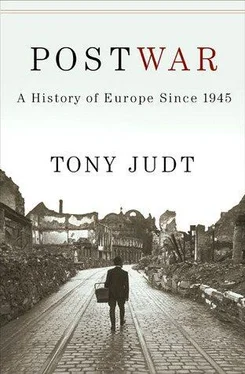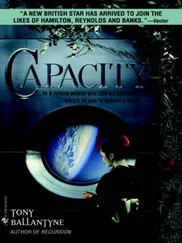The only concession French authorities in those years would make to the changing mood abroad came in December 1964 when the National Assembly belatedly incorporated the category of ‘crimes against humanity’ (first defined in the London accords of August 8th 1945) into French law and declared them imprescriptable. But this too had nothing to do with Vichy. It was a response to the Auschwitz Trial then under way in Frankfurt, and was intended to facilitate any future prosecution on French soil of individuals (whether German or French) for their direct participation in the Nazis’ exterminatory schemes. Just how very far it was from official thinking to re-open the question of France’s collective responsibility became clear in 1969, when the government forbade French television to show Le Chagrin et la Pitié (‘The Sorrow and the Anger’) by Marcel Ophuls.
Ophuls’ film, a documentary about the wartime occupation of Clermont Ferrand in central France, was based on interviews with French, British and German subjects. There was almost nothing in it about the Holocaust and not much about Vichy: its theme was the widespread venality and daily collaboration of the war years: Ophuls was peering behind the self-serving post-war story of resistance. But even this was too much for the authorities in the last year of De Gaulle’s presidency. And not just the authorities: when the film was finally released two years later, not on national television but in a small cinema in Paris’s Quartier Latin, one middle-aged woman was heard to comment, upon exiting the cinema: ‘Shameful—but what do you expect? Ophuls is Jewish, isn’t he?’
It is a point of some note that in France, uniquely, the breakthrough into a more honest engagement with wartime history was the work of foreign historians, two of whom—Eberhard Jäckel in Germany and Robert Paxton in the US, both of whose major books were published between the end of the Sixties and the mid-Seventies—were the first to use German sources to demonstrate how much of Vichy’s crimes were undertaken at French initiative. This was not a subject that any native-born scholar had felt comfortable addressing: thirty years after the Liberation of France, national feelings were still acutely sensitive. As late as 1976, on learning the details of an exhibition planned to memorialize French victims at Auschwitz, the Ministère des Anciens Combattants (Ministry of Veterans’ Affairs) requested certain changes—the names on the list ‘lacked a properly French resonance’”. [424]
As so often in France in those years, such sentiments probably had more to do with wounded pride than with unadorned racism. As recently as 1939, France had been a major international power. But in three short decades it suffered a shattering military defeat, a demeaning occupation, two bloody and embarrassing colonial withdrawals, and (in 1958) a regime change in the form of a near-coup. La Grande Nation had accumulated so many losses and humiliations since 1914 that the compensatory propensity to assert national honour on every possible occasion had become deeply ingrained. Inglorious episodes—or worse—were best consigned to a memory-hole. Vichy, after all, was not the only thing that the French were in a hurry to put behind them—no-one wanted to talk about the ‘dirty wars’ in Indo-China and Algeria, much less the torture practised there by the army.
De Gaulle’s departure changed little in this respect, even though a younger generation of Frenchmen and -women showed scant interest in national glory and had no personal investment in the myths surrounding France’s recent history. In coming years the French undoubtedly became more aware of the Holocaust and sensitive to Jewish suffering in general—in part thanks to the outrage that followed De Gaulle’s notorious press conference of November 27th 1967, in the aftermath of Israel’s victory in the Six-Day War, when the French President referred to Jews as ‘a people sure of themselves and domineering’. And the 1985 documentary film Shoah , by the French director Claude Lanzmann, had a dramatic impact upon French audiences, despite (or perhaps because of) being concerned almost exclusively with the extermination of Jews in the East.
But even though French historians—following in the wake of their foreign colleagues—were now establishing beyond question the overwhelming responsibility of France’s wartime rulers for the fate of Jews deported from French soil, the official French stance never varied. From Georges Pompidou (president from 1969 to 1974) through Valéry Giscard d’Estaing (1974-1981) and on to François Mitterrand (1981-1995), the line remained the same: whatever was done under or by the Vichy regime was the affair of Vichy. Vichy may have taken place in France and been the work of certain Frenchmen. But Vichy was an authoritarian parenthesis in the history of the French Republic. Vichy, in other words, was not ‘France’, and thus France’s public conscience was clear.
President Mitterrand, the last French head of state to experience World War Two as an adult (he was born in 1916), had special reason to maintain this Jesuitical distinction. A former Vichyite civil servant, Mitterrand built his subsequent political career in large measure by obscuring the compromises and ambiguities of his own biography and by projecting those ambiguities onto the country at large. He studiously avoided any reference to Vichy on public occasions; and while he was never reluctant to speak out about the Holocaust in general—whether in Jerusalem in 1982 or at home on the fiftieth anniversary of the July 1942 round-up of 12,884 Parisian Jews—he never let slip any suggestion that this was an affair in which France had debts to pay.
The taboo that Mitterrand enforced, embodied and would surely have taken to his grave was finally broken (as so often in this matter) by a series of trials. In 1994, after nearly fifty years in hiding, Paul Touvier—an activist in Vichy’s wartime Milice—was caught and brought to trial for the murder of seven French Jews in June 1944 near Lyon. In himself Touvier was unimportant: a cog in the Vichy machinery and a collaborator of Klaus Barbie, the Gestapo head in Lyon who had been captured and tried in 1987. But Touvier’s trial—and the evidence that came out concerning the Vichy authorities’ collaboration with the Gestapo and their role in the deportation and murder of Jews—served as a kind of ersatz for other trials that never happened: notably that of René Bousquet, the senior police administrator at Vichy. The prosecution of Bousquet, who in 1942 personally negotiated with the German authorities for the delivery of Jews, might have provided France with an occasion to confront the truth about Vichy. And not just Vichy, for Bousquet had lived unscathed for many decades in post-war France, protected by friends in very high places—including Mitterrand himself. But before he could be brought to trial Bousquet was conveniently assassinated (by a ‘lunatic’) in June 1993.
In the wake of Touvier’s condemnation, and in the absence of Bousquet, the French judiciary at last found the courage (after Mitterrand’s death) to inculpate, arrest and prosecute another major figure, Maurice Papon. A sometime government minister and police chief of Paris under De Gaulle, Papon had been employed as secretary-general of the Bordeaux administrative region during the war. This was a purely bureaucratic post, and his stint in Bordeaux in the service of Pétain had proven no impediment to Papon’s successful post-war career as a public servant. While in Bordeaux, however, Papon had been directly responsible for authorising the arrest and despatch of the region’s Jews to Paris and thence into deportation. It was for this—now defined under French law as a crime against humanity—that he was placed on trial in 1997.
Читать дальше












